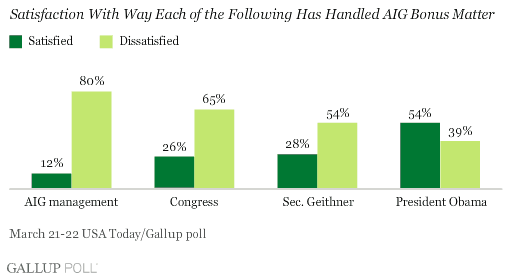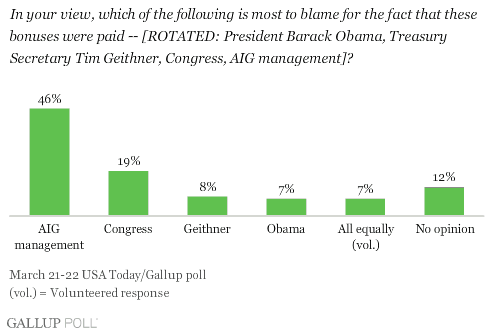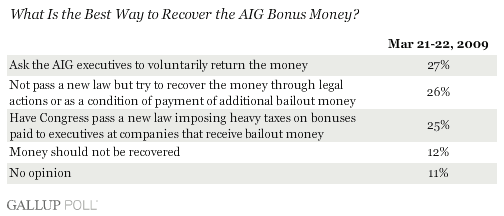PRINCETON, NJ -- For the most part, the central players in the AIG bonus controversy have come out looking badly -- with one notable exception. A majority of Americans are dissatisfied with the way AIG management, Congress, and Treasury Secretary Geithner have handled the matter. Only President Obama gets a more positive than negative evaluation.

This is based on a new USA Today/Gallup poll, conducted March 21-22, after a week when the AIG bonuses dominated the news headlines.
While the AIG executives' role in the controversy is obvious, a provision inserted into the $787 billion economic stimulus bill passed by Congress paved the way for the bonuses to be paid. Also, it was reported that both Geithner and Obama knew the bonuses were being paid before the story became public. Geithner will likely face questions about his role in the matter when he testifies before Congress Tuesday.
Still, Americans believe the AIG executives shoulder the greatest blame. Given a choice of four major players in the drama, 46% of Americans say AIG executives are most to blame for the payouts, far more than say this about Congress, Geithner, or Obama.

Recovering the Money
An instant Gallup reaction poll to the AIG bonus controversy conducted early last week showed that a majority of Americans described themselves as "outraged" by the bonuses, and three in four said the government should recover the money.
While testifying before Congress last week, AIG CEO Edward Liddy indicated that he had asked the recipients of the larger bonus amounts to voluntarily return at least half the money. The U.S. House of Representatives responded by passing a bill to impose heavy taxes on any bonuses paid to higher-income employees by companies receiving significant amounts of federal bailout money, which would essentially chew up the total amount of the bonus.
Sixty-nine percent of Americans believe that "all" of the bonus money should be recovered, while 13% say "half" of it should be, and 12% believe none of it should be.
Although Americans are in wide agreement that the money should be returned, they show a decided lack of consensus on how that should be accomplished. Only 25% would seem to agree with the House approach of passing a new law to heavily tax the money. Roughly the same proportion (27%) would favor asking the employees to voluntarily return the money. Also, a similar percentage (26%) would prefer that the government try to recover it through legal proceedings based on existing laws or by making the return a condition for the company's receiving additional government bailout money. The remaining 23% of Americans do not have an opinion or do not believe the money should be recovered.

Notably, only 29% of self-identified Democrats favor a new law to tax the bonuses, along the lines of what the Democratically controlled House passed last week. Democrats are as likely to favor voluntary return of the bonuses (28%) or trying to recover the bonus through other government means (28%).
Republicans, too, show little consensus on the best way to recover the bonuses: 26% favor voluntary returns of the money, 24% support heavy taxes on it, and 21% prefer that the government recover it by means other than new legislation.
Nineteen percent of Republicans say the bonus money should not be returned, compared with 11% of independents and only 7% of Democrats.
Implications
Outrage over the AIG bonuses is widespread among American citizens as well as U.S. government officials. Americans believe both AIG and the federal government -- aside from President Obama -- handled the matter poorly. And the public overwhelmingly believes the money should be recovered in part or in its entirety.
What is less clear is exactly how that money should be recovered. The House took a step by passing the tax measures last week, but it is unclear whether the Senate will take a similar approach or whether Obama would sign such legislation into law. And while there are other options besides the tax approach -- including AIG executives' returning the money on their own, as some reportedly have done, or a lawsuit to recover the money -- so far the public has not coalesced behind one approach or the other.
That could change in the coming days as the Senate and President Obama develop other approaches to recovering the money and try to round up the necessary support to move forward.
Survey Methods
Results are based on telephone interviews with 2,019 national adults, aged 18 and older, conducted March 21-22, 2009. All questions were asked of randomly selected half-samples of respondents. Sample sizes for the random half-samples vary between 1,003 and 1,012 national adults. For results based on these samples of national adults, one can say with 95% confidence that the maximum margin of sampling error is ±3 percentage points.
Interviews are conducted with respondents on land-line telephones (for respondents with a land-line telephone) and cellular phones (for respondents who are cell-phone only).
In addition to sampling error, question wording and practical difficulties in conducting surveys can introduce error or bias into the findings of public opinion polls.
